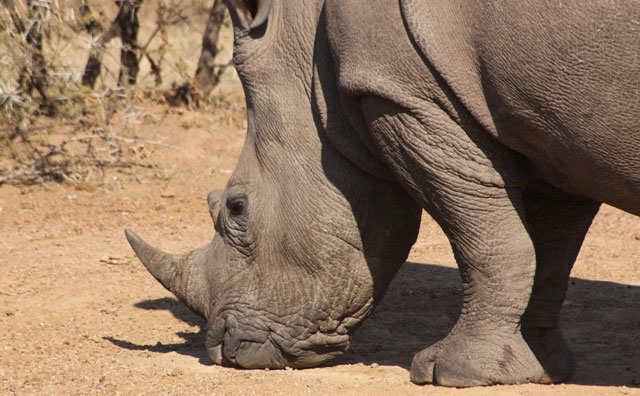
The Hawks are working on a project with state-owned Denel Dynamics to find the right drone technology in the fight against rhino poaching, parliament heard on Friday.
Parliament’s police committee was briefed by the South African Police Service, the South African National Parks (SANParks) and the Hawks on the fight against rhino poaching in the Kruger National Park.
Hawks boss Major General Mthandazo Ntlemeza and his team told parliament’s police committee on Friday that Denel had plenty of technology to share.
He was responding to a question from committee chair Francois Beukman, who wanted to know if the unit had been to Kenya to find out about the drone programme there.
Lieutenant General Khehla Sithole told the committee that they had not gone to Kenya because they were busy exploring high technology options at home.
“We went to Denel, where they demonstrated the drones they can make available to us, the various sizes,” he said.
But he said when they engaged with SANParks, and drones were tested at Kruger Park, the first results were not positive.
The drones did not respond correctly, Sithole said.
They ended up picking up all the heat signals.
“But when we engaged with Denel, they indicated that they had better technology, so we are running a project with Denel,” he said.
This was one of the ways the team fighting rhino poaching were using to get tech savvy in the fight against rhino poaching, he said.
The teams were also being capacitated in terms of cybercrime.
However, the teams were also going to go low-tech and engaging communities to be more involved.
Ntlemeza told parliament that they would be doing door to door to educate communities against unknowingly providing accommodation for poachers around Kruger National Park.
Kruger National Park’s General Johan Jooste said community engagement was a top priority.
In the long run, this would be the only thing that would save the park, he said.
Other anti-poaching measures include visible policing, deployment of rangers and counter-intelligence.
This included lie detector tests for rangers, vetting and continuous testing of firearms.
General Phuntshe Chipu, who gave the presentation, told the committee that one of the challenges faced was the expense of the operations.
The police spent R5m/month on accommodation for members as the affected areas were mostly situated in secluded areas, he said.
He told the committee that 317 people were arrested for rhino poaching last year, while 39 horns were confiscated.
Almost 200 hunting rifles, three shotguns, 39 silencers, and 17 vehicles have been confiscated. — News24




